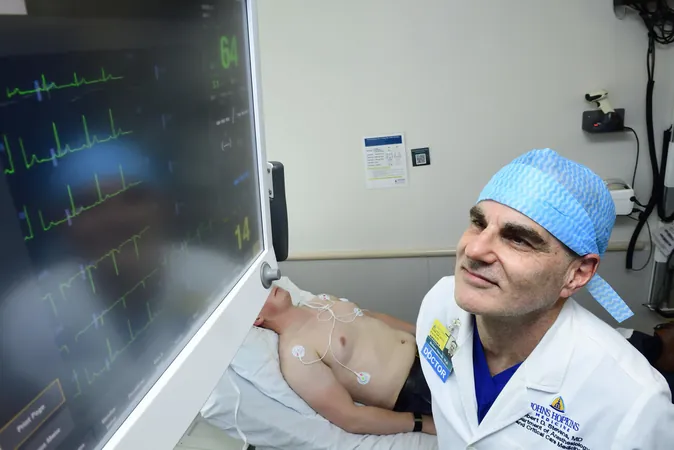
AI Outshines Doctors in Predicting Surgery Complications: A Game Changer in Patient Care!
2025-09-17
Author: Nur
In a groundbreaking development, researchers from Johns Hopkins University have unveiled an innovative artificial intelligence model that significantly outperforms traditional risk assessments used by doctors. This model leverages data from routine heart tests to accurately predict the likelihood of deadly complications following surgery.
The federally funded study reveals that basic electrocardiograms (ECGs), typically employed before major surgeries, can provide invaluable insights. "We demonstrate that a basic electrocardiogram contains important prognostic information not identifiable by the naked eye," stated Robert D. Stevens, chief of the Division of Informatics, Integration, and Innovation at Johns Hopkins Medicine.
Traditionally, medical risk scores used by physicians only achieve approximately 60% accuracy in predicting post-surgical complications. With the rising number of patients facing life-threatening issues after major procedures, this new AI approach could redefine how both patients and surgeons assess risk.
Harnessing the power of machine learning, the Johns Hopkins team examined preoperative ECG data from a staggering 37,000 patients at Beth Israel Deaconess Medical Center. They developed two models: one focused solely on ECG data and the other—a "fusion" model—integrating ECG results with additional patient information like age, gender, and pre-existing conditions.
The ECG-only model showed impressive predictive capabilities, eclipsing the current risk scores, while the fusion model achieved an astonishing 85% accuracy in identifying patients at risk of heart attacks, strokes, or even death within 30 days post-surgery.
"It's surprising that we can take this routine diagnostic, this 10 seconds worth of data, and predict if someone will die after surgery," remarked Carl Harris, the lead author and a PhD student in biomedical engineering. This revelation could significantly enhance the surgical risk assessment process.
In addition, the research team introduced a methodology to clarify which specific features of the ECG correlate with potential heart attacks or strokes after surgery. The idea is not just to tuck ECG results away in medical records but to actively utilize them for risk assessments discussed between patients and doctors.
As the team gears up for future tests on larger datasets, they're also eager to apply this AI model in prospective evaluations for forthcoming surgeries. Their goal? To uncover even more critical data embedded within ECGs through AI analysis.
This transformative step forward holds enormous promise for patient care, potentially saving countless lives by enabling proactive medical decisions.


 Brasil (PT)
Brasil (PT)
 Canada (EN)
Canada (EN)
 Chile (ES)
Chile (ES)
 Česko (CS)
Česko (CS)
 대한민국 (KO)
대한민국 (KO)
 España (ES)
España (ES)
 France (FR)
France (FR)
 Hong Kong (EN)
Hong Kong (EN)
 Italia (IT)
Italia (IT)
 日本 (JA)
日本 (JA)
 Magyarország (HU)
Magyarország (HU)
 Norge (NO)
Norge (NO)
 Polska (PL)
Polska (PL)
 Schweiz (DE)
Schweiz (DE)
 Singapore (EN)
Singapore (EN)
 Sverige (SV)
Sverige (SV)
 Suomi (FI)
Suomi (FI)
 Türkiye (TR)
Türkiye (TR)
 الإمارات العربية المتحدة (AR)
الإمارات العربية المتحدة (AR)